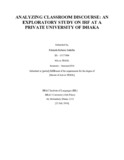| dc.contributor.advisor | Farhat, Nazah | |
| dc.contributor.author | Omotayo, Baqau Hassan | |
| dc.date.accessioned | 2024-12-10T08:07:33Z | |
| dc.date.available | 2024-12-10T08:07:33Z | |
| dc.date.copyright | ©2024 | |
| dc.date.issued | 2024-08 | |
| dc.identifier.other | ID 22303068 | |
| dc.identifier.uri | http://hdl.handle.net/10361/24885 | |
| dc.description | This thesis is submitted in partial fulfillment of the requirements for the degree of Bachelor of Arts in English, 2024. | en_US |
| dc.description | Cataloged from PDF version of thesis. | |
| dc.description | Includes bibliographical references (pages 48-53). | |
| dc.description.abstract | Politicians strategically use language to degrade their opponents and persuade the electorate
to think, behave, and vote in certain ways. The 2023 Nigerian General Elections witnessed an
interesting use of various communicative modes for meaning-making. This study employs a
qualitative research method, using a case-study design, to examine negative image formation
in Nigerian political settings. While past studies have examined different political discourses
in Nigeria, the present study focuses on how politicians use language to misrepresent their
opponents and manipulate the electorate in the 2023 Nigerian General Elections’ campaign
songs. To deconstruct the language and imagery used in these songs, I employ Fairclough’s
three-dimensional framework of Critical Discourse Analysis (CDA) as the main theoretical
framework and Kress and van Leeuwen’s visual grammar framework of Multimodal
Discourse Analysis (MDA) as a supportive framework. The findings reveal how politicians
craft their messages by exploiting socio-political situations and using various discursive
strategies, linguistic features, and modes to construct negative images of their opponents and
manipulate the electorate through different means. I argue that such strategies are problematic
to a democratic system, as they create negative images of others and manipulate voting
behaviours, resulting in poor electoral outcomes. | en_US |
| dc.description.statementofresponsibility | Baqau Hassan Omotayo | |
| dc.format.extent | 69 pages | |
| dc.language.iso | en | en_US |
| dc.publisher | Brac University | en_US |
| dc.rights | Brac University theses are protected by copyright. They may be viewed from this source for any purpose, but reproduction or distribution in any format is prohibited without written permission. | |
| dc.subject | Negative image formation | en_US |
| dc.subject | Political campaign songs | en_US |
| dc.subject | Nigerian general election 2023 | en_US |
| dc.subject | Political discourse | en_US |
| dc.subject | Critical discourse analysis | en_US |
| dc.subject | Nigerian electoral discourse | en_US |
| dc.subject.lcsh | Advertising, Political--Nigeria. | |
| dc.subject.lcsh | Political campaigns--Nigeria. | |
| dc.subject.lcsh | Elections--Nigeria. | |
| dc.subject.lcsh | Negativism--Political aspects--Nigeria. | |
| dc.subject.lcsh | Music--Political aspects--Nigeria. | |
| dc.subject.lcsh | Discourse analysis--Political aspects--Nigeria. | |
| dc.subject.lcsh | Language and languages--Political aspects. | |
| dc.title | Negative image formation: a multimodal critical discourse analysis of political campaign songs in Nigerian electoral discourse | en_US |
| dc.type | Thesis | en_US |
| dc.contributor.department | Department of English and Humanities, Brac University | |
| dc.description.degree | B.A. in English | |




